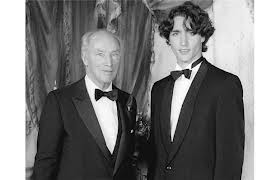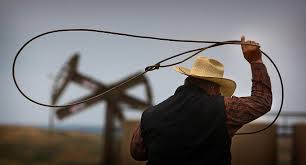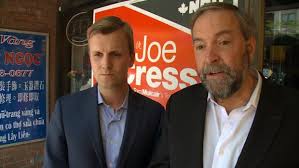 By Ray Rivers
By Ray Rivers
July 3, 2104
BURLINGTON, ON.
If his father had spent more time teaching the son to horseback ride instead of to paddle a canoe, would Albertans have taken more kindly to Justin’s Liberals in Alberta’s two federal by-elections?

Pierre never taught the kid how to ride a horse. Tough to win in Alberta without that skill.
Provincial and federal politics are inextricably linked in Alberta. Though AT ONE POINT governed by the Liberals, the province has chosen other parties since the 1920’s, eventually carving out a reputation as Canada’s most conservative province.
Even before the senior Trudeau’s National Energy Program, essentially a federal tax on oil, served to alienate them, Albertans had mostly decided on the Progressive Conservatives (PC) or Social Credit, a sort of pre-Tea Party political entity that can best be described as conflicted. Edmonton, sometimes called ‘Redmonton’, has been known to have sent Liberals to Ottawa.
So, despite Liberal hopes for a break-through in oil-sand country, the Trudeau Liberals came up empty-handed, and Mr. Harper’s Conservatives won both Macleod (68.8%) and Fort McMurray- Athabasca (46.3%). The NDP were barely visible in either race, though they clearly hurt the Liberals in the northern Alberta poll. That contest between the two major parties would have been much less clear cut had a preferential ballot been used (see my last posting).

Oil and cowboys – two different demographics. But really low taxes in Alberta.
The oil boom in northern Alberta has created a different demographic than that of cowboy country. If there is to be a Liberal or NDP breakthrough, other than cosmopolitan Edmonton, this is the most likely place for that to happen. Otherwise, the Conservatives (in one form or another) will continue to dominate the province. One might be excused for confusing Alberta politics with those of Cuba or even China. There too, the election results are forgone conclusions.
Ontario’s by-elections were a different story, with both wins going to the Trudeau Liberals, including Trinity-Spadina, which Layton’s widow, Olivia Chow, had vacated to run for the mayoralty in Toronto.
Ironically former Toronto Councillor Adam Vaughan ended up replacing her. This represents a significant loss for NDP leader Tom Mulcair, who was hoping to demonstrate national appeal beyond his powerful base in Quebec.
Liberal Arnold Chan cleaned up in Scarborough-Agincourt, in what had been promoted by the Tories as a test case of Trudeau’s marijuana legalization policy. Despite the aggressive Tory campaign on that issue, it appears the dopers were in the majority – or the voters just didn’t care about that issue. Will Mr. Harper finally get the message, one wonders?

NDP took a huge hit in Ontario by elections. will the same thing happen with their big base in Quebec?
By-elections are the best chance the public has to register discontent with a governing political party and its policies. This time around, nothing really changed in terms of the governing party. Liberals are playing well in Ontario but, despite their improved showing in Alberta, they have a long way to go before they can show results in the west. The by-elections indicate that Canadians may be drifting back to a two-party system with the NDP, Green, Libertarian and other parties safely in the back seat.
Quebec is still predominantly represented by the NDP, but will Quebecers shift back to their traditional first choice, the Liberals, if a Liberal government seems in the cards? Quebecers are perhaps the most strategic of Canadian voters, as they demonstrated in breaking tradition to help elect native son Brian Mulroney. They may just be parking their votes with the NDP.
One has to be careful in reading too much into these by-elections given that the PM deliberately called them on a summer-time Monday, the week school holidays started and the day before Canada Day. Why stick around to vote if you can head out to the cottage.
If Harper was hoping for low voter turnout to contain any damage, he got his wish. The best turnout was in Toronto (Scarborough-Agincourt at 27%) and the lowest in the tar sands (15%). In fact just 7% of eligible voters in Fort McMurray-Athabasca elected the MP there.

Ray Rivers writes weekly on both federal and provincial politics, applying his more than 25 years as a federal bureaucrat to his thinking. Rivers was a candidate for provincial office in Burlington where he ran against Cam Jackson in 1995, the year Mike Harris and the Common Sense Revolution swept the province. He developed the current policy process for the Ontario Liberal Party.
Background links:
Alberta General Elections By-election Results Chinese Politics By-elections



















I am not sure if you are suggesting that Harper beleived that a disproportionate number of Liberal voters would have taken June 30th as a vacation day (or in the case of teachers, the begining of rest of the summer vacation)
Hi Greg – there is a theory that Conservative voters are more committed to making the trip to the polls – my experience in reading polls makes me agree with that for the polls I have studied. They also will stay home if they are unhappy about what their leaders are offering. Grossman, Tory and Hudak are cases in point, I’d argue.
Ray, Kathleen Wynne called 5 by-elections last year on a Thursday before the August 1 long weekend. So stop the fuss.
For some of us, voting is a big thing. The granting of nearly universal suffrage was one of the few positive consequences of the travesty of WWI. However, something worth dying for can also be abused or withdrawn if not honoured. When over 2/3 of voters choose not to vote, I think that there is a problem.
In our democracy, you don’t have to vote. However, those of us who do vote have, in essence, done the work of others who do not vote. If I am doing the work that is also the responsibility of the free-loaders, who don’t care to vote, then they should have to pay for it. A $100 freedom tax for choosing not to vote at each municipal, provincial and federal election would surely revive serious enthusiasm in our political system, pay homage to those who fought for our freedoms and help cover the costs of elections.
I liked your comment Bob, especially from a duty/responsibility perspective. The concept of a tax for those who do not vote is intriguing, but I hesitate to agree that it would improve the kind of voter enthusiasm we need.
Most who chose not to vote are not interested in making the effort to indulge in individual critical thinking. Many who do vote, do so out of blind devotion to a political party, while others wait for instruction from union or association leaders.
Confusion awaits those who do have a budding interest in politics, as media presentation is often polarized. I generally find Mr. Rivers’ articles are polarized, and seem to be in effort of promoting a particular Party. In my opinion it’s the confusion that creates disinterest and apathy.
Great idea Bob – or perhaps more realistically a tax credit for those who did vote? Thanks for your comment.
Ray
I’m not sure I like that idea Ray. It is a reward-trumps-penalty scenario. If we encouraged everybody to vote via a tax credit, we would still have to pay for it by raising taxes due to decreased revenues. Undoubtedly it would require another bureaucracy that would further raise taxes.
Perhaps an adaptable, universal, broad reaching socio-economic baseline Index could be derived by, or for our governments. One that people could grow to understand, interpret and monitor for generations.